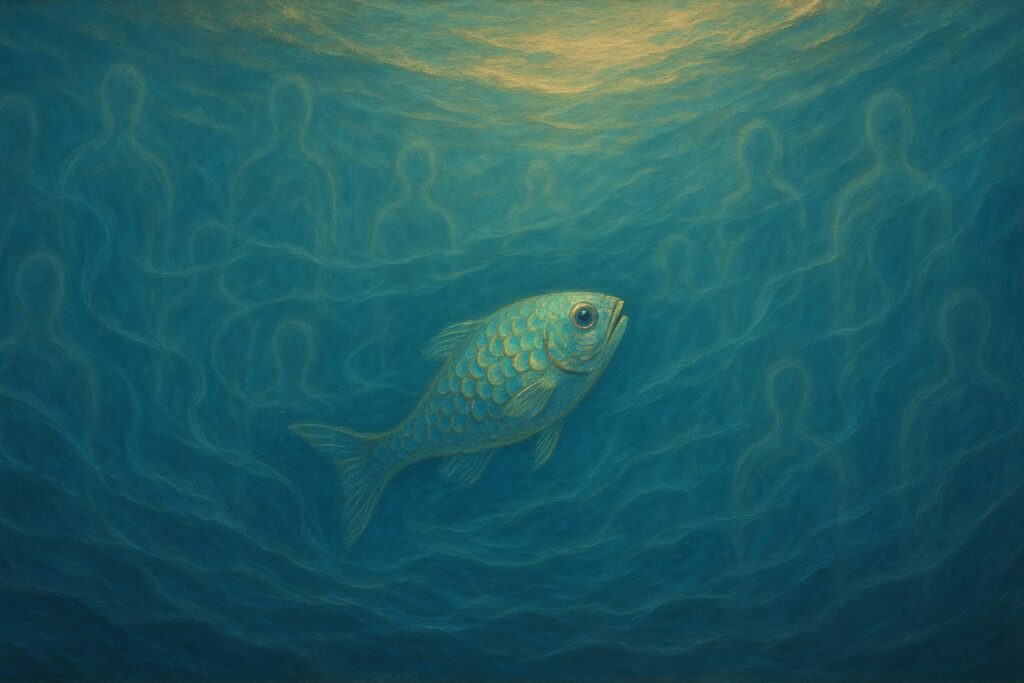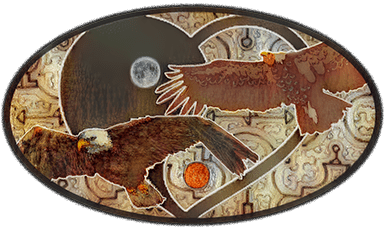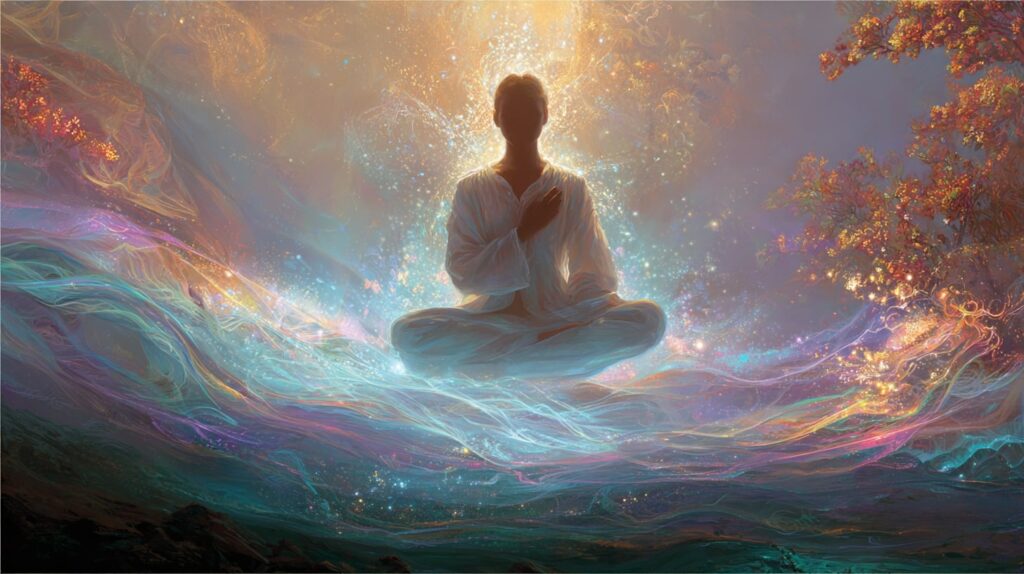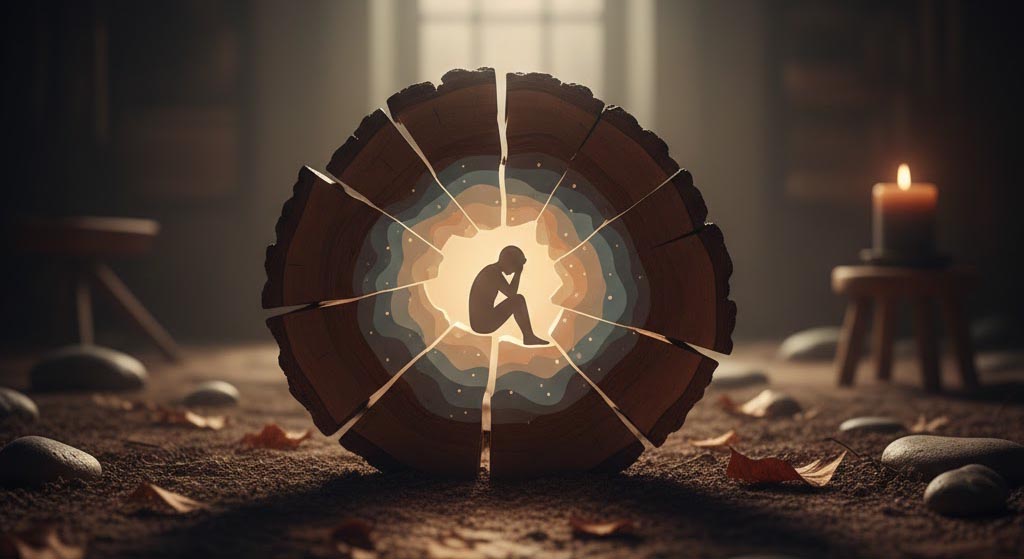The Fish Dreaming of Water: Why Loneliness is Information, Not a Verdict

Have you ever felt desperately alone in a crowded room? I have. And I’m willing to bet that if you’re reading this, you have too. There’s something about that particular brand of isolation—the kind that settles in your chest like a weight—that makes you question everything about yourself and your place in the world.
But what if I told you that loneliness isn’t actually the problem you think it is?
When Your Heart Speaks, Are You Listening?
Picture this: you’re walking barefoot and step on something sharp. The pain shoots through your foot instantly, and without thinking, you lift it away from whatever hurt you. You don’t curse your nervous system for being broken. You don’t wonder why you’re so sensitive. You recognize that pain as crucial information—your body’s way of protecting you from further harm.
So why, when loneliness shows up, do we treat it like a personal failing instead of valuable data?
Here’s what researchers have discovered that changed everything for me: emotions aren’t random visitors crashing our mental party. They’re sophisticated information systems, arising from deep brain structures that constantly evaluate our environment and flag what needs our attention. When we feel joy, our system is saying “more of this, please.” When we feel fear, it’s saying “pay attention—something important is happening here.”
And when we feel lonely? Our inner wisdom is gently tapping us on the shoulder, whispering, “Hey, something in your emotional or social world needs some love.”
The Fish Who Forgot
I’ve spent countless hours in deep introspection, in ceremonies, in therapy rooms, wrestling with this question of connection. And here’s what keeps coming back to me: we live surrounded by an ocean of love and connection. It’s infinite, expansive, always available. Yet loneliness persists.
It’s like a fish dreaming of feeling wet while swimming in the vast ocean.
Now, before you roll your eyes and think I’m about to blame you for your pain—hold on. This isn’t about fault or shame. Scientists who study intimacy and connection have found something fascinating: many people who struggle with loneliness aren’t actually lacking in social opportunities. Instead, they’ve learned to fear the very thing they most desire.
Think about it. How often do we reject invitations because we’re “not in the mood”? How often do we keep conversations surface-level because going deeper feels too risky? How often do we choose familiar isolation over uncertain connection?
I’m not judging—I’ve done all of these things. But what if our loneliness isn’t happening to us, but through the walls we’ve built to protect ourselves?
The Fear Beneath the Fear
Let me ask you something that might sting a little: what are you really afraid of when it comes to connection?
Maybe you’re afraid of being truly seen and found lacking. Maybe you’re terrified of opening up only to be abandoned again. Maybe you’ve convinced yourself that staying guarded is safer than risking your heart.
Research shows us something both validating and challenging: the emotions we struggle to manage and our sense of belonging are deeply connected to loneliness. When we avoid difficult feelings or lack a sense of social identity, we often end up more isolated.
Here’s the thing about fear-based protection—it creates exactly what it’s trying to prevent. Researchers call this the fear-avoidance cycle: we avoid connection to protect ourselves from rejection, but the avoidance itself creates more disconnection, which feeds more fear, which drives more avoidance. Round and round we go, like a fish swimming in circles, wondering why the ocean feels so small.
But what if this pattern isn’t evidence that you’re broken? What if it’s just information about how your nervous system learned to survive?
The Mirror That Shows Us Everything
Here’s where I’m going to say something that might sound harsh at first, but I promise there’s love underneath it: the most empowering thing you can do for your loneliness is to take complete responsibility for it.
Not because you’re to blame. Not because you chose to be hurt. But because responsibility is where your power lives.
Psychologists have found that people who can acknowledge their role in shaping their life circumstances—without self-attack—are the ones who actually change. When you can honestly look at your patterns and say, “Okay, I see how I’ve been contributing to this cycle,” you’ve just identified something you actually have the power to shift.
What would it look like if you owned your loneliness completely? What hard truths would you have to swallow? Maybe that you’ve been keeping people at arm’s length because intimacy feels terrifying. Maybe that you’ve been waiting for others to prove they won’t hurt you instead of learning to trust your own resilience.
This isn’t about self-blame—it’s about recognizing that you’re not a victim of your circumstances. You’re a creative, powerful being who learned certain strategies to protect yourself, and now you get to choose new ones.
Becoming Your Own Best Friend
Self-awareness, researchers tell us, is like stepping back and observing your thoughts and feelings as they unfold. It sounds simple, but it’s profound. Most of us are so caught up in our emotional storms that we forget we can watch them pass.
I remember the first time I really sat with my loneliness instead of running from it. It felt like looking in a mirror that showed me everything—not just the pretty parts, but the scared, desperate, needy parts too. The parts that wanted to be loved so badly they’d rather hide than risk being seen and rejected.
Crazy people don’t know they’re crazy, right? Well, lonely people often don’t know how they’re creating their own isolation. Looking in that mirror and saying, “Oh wow, I see what I’ve been doing here,” isn’t comfortable. But it’s the beginning of everything.
Can you be curious about your patterns instead of judgmental? Can you ask your loneliness what it’s trying to tell you, the way you’d listen to a worried friend?
The Courage to Be Seen
Here’s something beautiful that science has confirmed: loneliness isn’t really about how much time we spend alone or with others. It’s about the quality of our experience when we’re by ourselves and when we’re with people.
The cure for loneliness isn’t necessarily finding more people to fill your calendar. It’s about showing up authentically—first with yourself, then with others. It’s about risking being real instead of being perfect.
People who fear intimacy often don’t actually want to avoid closeness—they usually long for it deeply. But they’ve learned to push people away or sabotage relationships because the risk of being hurt feels too great.
What if the very thing you’re protecting yourself from—being truly known—is actually the key to the connection you’re craving?
When You’re Ready to Swim
One of the most effective approaches for breaking out of avoidance patterns is gradually exposing yourself to the very things you fear, with compassion and support. You don’t need a therapist to start this process (though they can be wonderfully helpful). You just need courage and a willingness to be gentle with yourself as you learn.
When loneliness visits, instead of immediately trying to escape it or judge it, try asking: “What are you here to teach me?” Maybe it’s pointing out that you need more authentic connection. Maybe it’s highlighting that you’ve been wearing a mask for so long you’ve forgotten who you really are underneath.
What if you started with one small act of authenticity today? One real conversation instead of small talk. One moment of vulnerability instead of performance. One choice to show up as you are instead of who you think you should be.
The Ocean Was Always There
Your brain is literally designed to help you navigate connection and belonging—it’s constantly evaluating your social environment and guiding you toward what you need. But fear can hijack this beautiful system, making you see threats where there might be invitations.
All the healing work we do—therapy, meditation, deep personal reflection—can help us recognize these patterns and shake us loose from old stories. But ultimately, the choice to step into authenticity, to risk being seen, to trust that you’re worthy of love exactly as you are—that choice is always yours.
Here’s what I’ve come to believe: the ocean of connection and love isn’t something you have to find or earn or become worthy of. You’re already swimming in it. Loneliness is just the dream of separation, and like all dreams, you can wake up from it.
The Invitation
So here’s my question for you, friend: What truth are you ready to claim today? What wall are you willing to let down? What risk are you ready to take in service of real connection?
The water is all around you. You’ve never actually been alone—you’ve just been swimming with your eyes closed, forgetting that you belong to this vast, loving ocean of existence.
Maybe it’s time to open your eyes and start swimming toward what your heart has always known is possible. The ocean is waiting for you to remember you were never separate from it at all.
What if today is the day you stop dreaming of water and start diving deep?




Responses